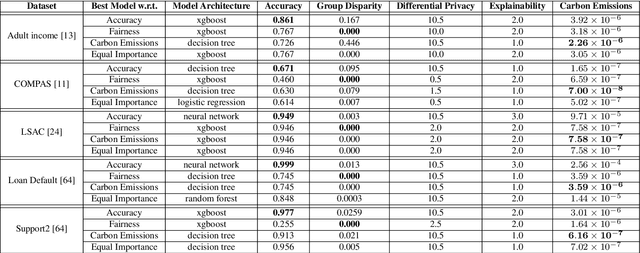A Comprehensive Sustainable Framework for Machine Learning and Artificial Intelligence
Paper and Code
Jul 17, 2024



In financial applications, regulations or best practices often lead to specific requirements in machine learning relating to four key pillars: fairness, privacy, interpretability and greenhouse gas emissions. These all sit in the broader context of sustainability in AI, an emerging practical AI topic. However, although these pillars have been individually addressed by past literature, none of these works have considered all the pillars. There are inherent trade-offs between each of the pillars (for example, accuracy vs fairness or accuracy vs privacy), making it even more important to consider them together. This paper outlines a new framework for Sustainable Machine Learning and proposes FPIG, a general AI pipeline that allows for these critical topics to be considered simultaneously to learn the trade-offs between the pillars better. Based on the FPIG framework, we propose a meta-learning algorithm to estimate the four key pillars given a dataset summary, model architecture, and hyperparameters before model training. This algorithm allows users to select the optimal model architecture for a given dataset and a given set of user requirements on the pillars. We illustrate the trade-offs under the FPIG model on three classical datasets and demonstrate the meta-learning approach with an example of real-world datasets and models with different interpretability, showcasing how it can aid model selection.
 Add to Chrome
Add to Chrome Add to Firefox
Add to Firefox Add to Edge
Add to Edge